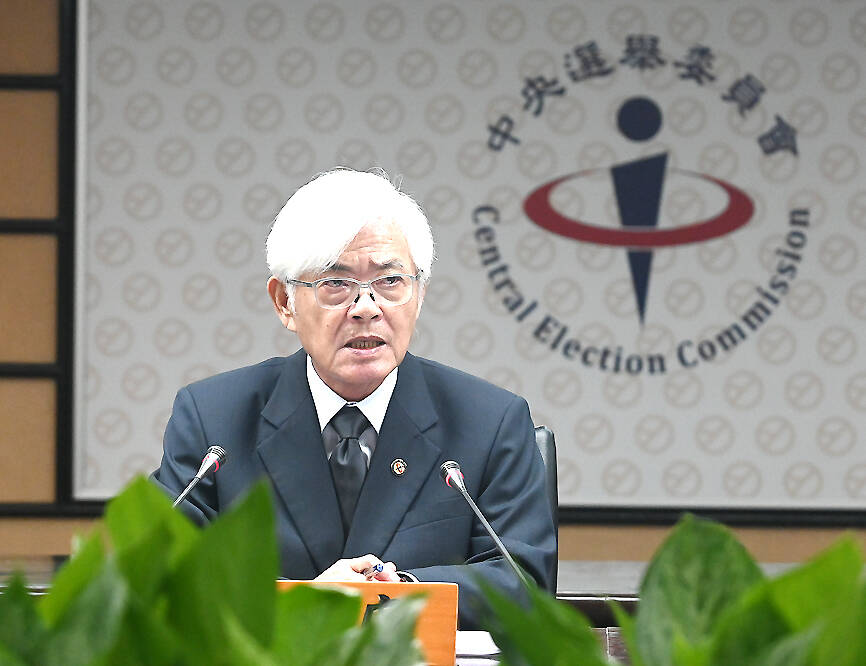Ten 10 independent tickets have been registered for petitions to become presidential and vice presidential candidates in the presidential election next year, the Central Election Commission (CEC) said.
The list unveiled by the commission on Monday shows that, apart from Hon Hai Precision Industry Co (鴻海精密) founder Terry Gou (郭台銘) and his running mate, Tammy Lai (賴佩霞), 18 other individuals, including Lan Hsin-chi (藍信祺), who is partnering with the head of the Gong He Party, Chou Ke-chi (周克琦), have registered for the signature drive.
Lan, an ex-convict who served 19 years in prison for a high-profile double homicide he committed in 1981, first registered to run for the presidency in 2011 after his release from jail, but his application was rejected. He again launched a signature drive for a presidential bid in 2015, but was unable to collect enough signatures.

Photo: Wang Yi-sung, Taipei Times
The list also includes Cheng Tzu-tsai (鄭自才), whose running mate is Huang Sheng-feng (黃聖峰). The former is an architect who became notorious after getting involved in a conspiracy in 1970 to assassinate late president Chiang Ching-kuo (蔣經國).
Under the Presidential and Vice Presidential Election and Recall Act (總統副總統選舉罷免法), the independent hopefuls must submit at least 289,667 signatures, or 1.5 percent of eligible voters in the previous presidential election, before Nov. 2 to qualify as candidates in the election on Jan. 13. They also must put up a NT$1 million (US$31,248) deposit.
The results of the petitions would be announced by Nov. 14, the CEC said.
If the number of signatures collected by an independent hopeful fails to reach half of the required number, the deposit would not be returned, but it would be handed back if at least 144,834 signatures are received.
Candidates nominated by parties or independent candidates who collect enough signatures to qualify to run are required to register from Nov. 20 to 24.
The presidential candidates nominated by the three major parties are Vice President William Lai (賴清德), who chairs the Democratic Progressive Party, New Taipei City Mayor Hou You-yi (侯友宜) of the Chinese Nationalist Party (KMT) and Taiwan People’s Party Chairman Ko Wen-je (柯文哲).
Meanwhile, the CEC said that overseas Taiwanese who want to vote in next year’s election must first register with a household registration office in Taiwan by Dec. 4, in the absence of an absentee voting system.
Overseas Taiwanese who want to vote in the election are required to register by mail with the household registration office where they last registered their address before moving abroad, CEC Chairman Lee Chin-yung (李進勇) said.
They can download and fill out the application form at https://2020.cec.gov.tw and send it to the household registration office, which would review the application and send the result back to them or to a designated person in Taiwan.
Taiwanese living abroad are eligible to vote in the presidential election if they are at least 20 years old, hold a Republic of China passport and previously had their household information registered in Taiwan for at least six months before moving overseas, CEC Vice Chairman Chen Chao-chien (陳朝建) said.

Taiwan is gearing up to celebrate the New Year at events across the country, headlined by the annual countdown and Taipei 101 fireworks display at midnight. Many of the events are to be livesteamed online. See below for lineups and links: Taipei Taipei’s New Year’s Party 2026 is to begin at 7pm and run until 1am, with the theme “Sailing to the Future.” South Korean girl group KARA is headlining the concert at Taipei City Hall Plaza, with additional performances by Amber An (安心亞), Nick Chou (周湯豪), hip-hop trio Nine One One (玖壹壹), Bii (畢書盡), girl group Genblue (幻藍小熊) and more. The festivities are to

Auckland rang in 2026 with a downtown fireworks display launched from New Zealand’s tallest structure, Sky Tower, making it the first major city to greet the new year at a celebration dampened by rain, while crowds in Taipei braved the elements to watch Taipei 101’s display. South Pacific countries are the first to bid farewell to 2025. Clocks struck midnight in Auckland, with a population of 1.7 million, 18 hours before the famous ball was to drop in New York’s Times Square. The five-minute display involved 3,500 fireworks launched from the 240m Sky Tower. Smaller community events were canceled across New Zealand’s

‘IRRESPONSIBLE’: Beijing’s constant disruption of the ‘status quo’ in the Taiwan Strait has damaged peace, stability and security in the Indo-Pacific region, MOFA said The Presidential Office yesterday condemned China’s launch of another military drill around Taiwan, saying such actions are a “unilateral provocation” that destabilizes regional peace and stability. China should immediately stop the irresponsible and provocative actions, Presidential Office spokeswoman Karen Kuo (郭雅慧) said, after the Chinese People’s Liberation Army (PLA) yesterday announced the start of a new round of joint exercises around Taiwan by the army, navy and air force, which it said were approaching “from different directions.” Code-named “Justice Mission 2025,” the exercises would be conducted in the Taiwan Strait and in areas north, southwest, southeast and east of Taiwan

UNDER WAY: The contract for advanced sensor systems would be fulfilled in Florida, and is expected to be completed by June 2031, the Pentagon said Lockheed Martin has been given a contract involving foreign military sales to Taiwan to meet what Washington calls “an urgent operational need” of Taiwan’s air force, the Pentagon said on Wednesday. The contract has a ceiling value of US$328.5 million, with US$157.3 million in foreign military sales funds obligated at the time of award, the Pentagon said in a statement. “This contract provides for the procurement and delivery of 55 Infrared Search and Track Legion Enhanced Sensor Pods, processors, pod containers and processor containers required to meet the urgent operational need of the Taiwan air force,” it said. The contract’s work would be